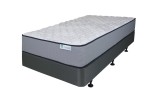Which electricity provider should I use in New Zealand?

It makes sense to compare electricity providers if you’re moving home, as you’ll need to ring your provider to inform them of the move. However, power companies in New Zealand regularly change how they price their services, so it’s a good idea to shop around every now and then.
Reassessing your power every 12 months, even if you’re staying in the same house, gives you an idea of how much you are paying compared to the rest of the market. And since knowledge is power, you can choose to switch providers (or stay put).
How much can I save by switching power companies?
2024 was a bumper year for Kiwis switching power companies. According to a survey published in Consumer New Zealand, New Zealanders who switched providers in June 2024 saved $524 per year. That’s up from an average saving of $329 the year prior.
The same survey showed:
-
concern over power prices had reached a three-year high
-
45% of Kiwis have been with their provider for five or more years
-
4 out of 5 respondents would change providers if they could save over $400.
By switching power providers, you could save around $43 per month plus you may also avoid the ‘loyalty penalty’ - where many Kiwis assume they’re getting preferential prices by being a loyal customer.
What should you know before you choose an electricity provider?
It’s a good idea to understand how electricity pricing works in New Zealand so that you can accurately compare providers. In general, electricity companies don’t make it easy for customers to compare rates and this works to their advantage.
Understanding Your Power Bill
In New Zealand, your power bill is made up of two main charges. You’ll see both on your monthly statement:
-
a fixed daily charge
-
a variable charge
Daily charge:
You’ll be charged a fixed price every day of the month. This fee is what providers charge to keep your home connected to the power supply. This daily charge remains the same regardless of how much power your household uses. Most power companies have two daily charges - those for high-use households (who are charged a higher daily rate) and low-use households (charged a lower rate.)
On average, a daily charge may cost a household between 60 cents and $1.20 per day.
Variable charge:
The reason your power bill fluctuates each month is your variable charge. This is calculated by multiplying the amount of kWh your household uses with your variable charge rate. Most power companies have two variable charges for low-use households and high-use households. Low users usually pay a higher rate per kWh than standard users.
On average, a variable charge (also called a kWh charge or unit charge) may cost a household between $0.15 to $0.25 for every 1 kWh used.
Extra Fees and GST
Besides the daily and unit charges, a levy is added by the Electricity Authority (EA) per kWh to help pay for the regulatory operations of New Zealand’s electricity market. You’ll also see GST applied to the total of all charges on your statement.
Are there other ways to save power than switching providers?
One of the best ways to save money (and understand how much you’ll save by switching providers) is to monitor the amount of kWh your household uses each year.
Compare the kWh usage on each of your monthly bills. In winter and autumn, you’ll naturally use more kWhs because it’s colder, and electric heating costs money.
After heating, appliances tend to use the most power. Investing in whiteware and appliances with a higher star rating will also help you save money. In New Zealand, all whiteware now comes with a stick showing how energy-efficient the appliance is.
What are the power providers in New Zealand?
New Zealand has four major providers and over 30 small providers. Some small retail brands are owned by our largest companies. Most power companies focus on more than just price. As a consumer, it’s important to think about what values you are looking for in a provider. Being able to bundle multiple utility services, clean energy or just a focus on good customer service may also be important to you.
Here’s what New Zealand’s four major providers say they focus on:
Genesis
They focus on looking after their customers and providing sustainable energy solutions for EVs or using solar power. Genesis offers options for electricity, gas, and LPG. They often have discounts or reward programs that benefit existing customers.
Contact
Contact Energy is more than just an energy company. They now provide electricity, gas, broadband and mobile bundles that can make it cheaper to move your wifi and power to their services and get rewards. This is a popular option for people looking for a one-stop home utilities provider.
Meridian
Meridian has a strong focus on renewable energy, using only hydro and wind power sources. They are a good option for eco-conscious households that want to minimise their environmental impact.
Mercury
Mercury is one of the largest providers, having recently merged with TrustPower. They offer electricity, gas, mobile and broadband bundles and have some loyalty perks. They emphasise clean energy and give customers flexibility in choosing service packages.
Popular smaller energy providers
There is no reason you need to choose a large energy provider. There are several smaller providers operating in cities and regions around New Zealand that make up our overall energy market.
Electric Kiwi
Offers Kiwis a free off-peak hour of power each day. This provider is ideal for households looking to reduce costs by shifting their energy use to certain times. They’re known for competitive rates and a tech-friendly app that helps users monitor their usage. They also offer mobile, power, and broadband bundles.
Flick
Flick is an independent electricity retailer based in Wellington. They offer two main plans: the Flat Plan, which provides a consistent rate per kilowatt-hour (kWh) regardless of usage time, and the Off-Peak Plan, featuring lower rates during off-peak hours. They also have tools that make it easy to monitor your electricity-related carbon emissions.
Powershop
Powershop has a different operating model where customers pre-purchase power in ‘power packs.’ This can give you more control over the cost of your power and can save you money by purchasing more during a promotion. They also have an app that makes monitoring your power, adjusting your usage and buying your power easy.
Frank Energy
This small provider is part of the Genesis Energy family. You won’t get discounts or any complex offers with Frank Energy, but that is part of their charm. They keep their plans low-cost and focus on transparent pricing and billing that is consistent and easy to understand.
What are the best ways to compare energy providers in New Zealand?
Get quotes
Ringing around or enquiring for quotes may take a little time but it can also allow energy providers to give you new customer deals that they might not advertise.
Tell your existing provider
Tell your existing electricity provider that you are thinking of switching to another company. Often, your current provider will give you a lower rate to get you to stay.
Use online comparison tools
There are several online comparison tools, some of which aren’t as effective as others. PowerSwitch is run by Consumer New Zealand, our consumer advocacy group, and is 100% independent.
Focus on comparing charges
Many providers will offer special bonuses to get you to switch providers, but it’s important to focus on what makes up the bulk of your bill - your daily charge and your variable charge. Getting an hour of off-peak power once a week or for an hour a day might not actually lower your bill.
Beware of bundles
Likewise, a bundle of electricity, mobile and broadband services may sound cheaper than paying for these services separately, but it’s important you understand how much each service costs independently. You may be paying for the convenience of a single bill.
Compare three providers
New Zealand has over 39 electricity providers, and there’s no way anyone has the time to compare all of them. In general, the big four can offer better deals than smaller companies. A good way to do your due diligence is to pick three providers and compare them.
Know it only takes a minute to switch
Comparing electricity providers is the hard part - and that’s only if you choose not to use the Powerswitch tool. Once you’ve found a new provider, it only takes five minutes to make the switch.
Did you know finding a mover is just as easy?

We can’t help you switch electricity providers, but we can help make finding a mover you trust easy. Wise Move takes the hard work out of finding a moving company with easy access to a wide range of trusted, affordable movers all in one place.
What do our customers say?





For every (wise)move
































